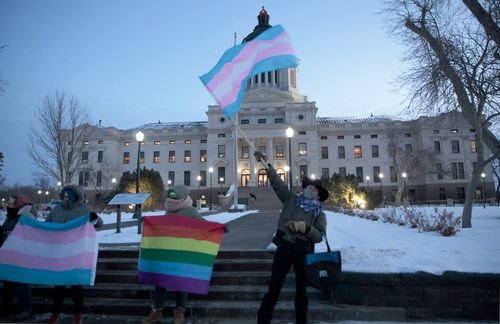Lawmakers in 14 states have proposed anti-LGBTQ bills, many of which target trans youth

As is custom at the beginning of the legislative session, state lawmakers across the country have proposed a torrent of bills intended to boost local economies, constrain or expand spending or make much-needed infrastructure fixes.
But mixed in among the standard bureaucratic business are bills that take aim at LGBTQ+ residents of states — bills that attempt to limit or dismantle their protections.
Just weeks into 2021, lawmakers in at least 14 states have proposed a slew of bills that would restrict the freedoms of LGBTQ residents. Most of the bills would affect transgender young people, according to Freedom For All Americans, the LGBTQ advocacy group that tracks the proposals.
NBC News was the first to report about the spate of anti-LGBTQ bills.
In Alabama, lawmakers proposed a bill that would ban physicians from prescribing medication to trans children that would affirm their gender. In Oklahoma, a proposed bill would lift a ban on conversion therapy and other practices that aim to suppress a minor’s sexual orientation or gender identity. And in Montana, lawmakers in the state House have already passed bills that restrict trans minors’ access to health care and even school sports.
Most of the bills won’t ever pass. But even introducing the legislation is damaging to LGBTQ people, especially youths, said Christy Mallory, legal director of UCLA Law’s Williams Institute, a research center that centers on gender identity and sexual orientation law.
“Even just the campaigns around the bills can be really stigmatizing and hurt kids, even if the bills don’t ultimately pass,” she said. “Just the fact that knowing that lawmakers are introducing these bills, people are seeing it and reading it, can signal to kids that maybe they’re not supported by their states, that their government is not behind them.”
Transgender young people in particular are already at a higher risk of physical and sexual violence and suicidal thoughts than their cisgender peers, according to the Trevor Project, a suicide prevention resource for LGBTQ youth. In this way, limiting trans young people’s rights by law and erasing their gender identities can be incredibly harmful, Mallory said.
A growing trend of discriminatory bills
There’s been a troubling trend of bills aimed at limiting LGBTQ rights since the mid-2010s, a “discriminatory response to the successful (same-sex) marriage litigation,” said Jenny Pizer, law and policy director of Lambda Legal, a national legal organization that works to advance the civil rights of LGBTQ people.
Lawmakers started to specifically target young trans people since 2016, when North Carolina passed its infamous “bathroom bill,” which restricted transgender people from using the restroom that corresponded with their gender identity in government-run buildings. That bill was repealed in 2017, though activists at the time said the political compromise still allowed some discrimination against trans North Carolinians to persist, Mallory said.
Even though the bill was later repealed, North Carolina’s bathroom bill inspired a slew of “copycat bills” that took aim at transgender people’s access to bathrooms, school sports and, critically, gender-affirming health care, Mallory said.
Though the North Carolina bill passed before the 2016 presidential election, some lawmakers who’ve introduced similar bills since have likely been influenced by the Trump administration’s often “hostile” policies toward LGBTQ and trans Americans, Mallory said, like the former President’s transgender military ban or his attempts to roll back protections against discrimination in health care.
It’s possible that some lawmakers are proposing new anti-LGBTQ laws as a response to the new Biden administration, Pizer said, which already lifted the trans military ban and enacted an executive order expanding protections for transgender people on Inauguration Day.
“We need to anticipate that some of those who prioritize creating licenses to discriminate against us will return their attention to states they perceive as welcoming their anti-LGBTQ agenda,” Pizer said.
The bills that activists fear the most
Of the bills proposed so far, Freedom For All Americans is most concerned about two proposals in Montana — one that bans trans students from playing a school sport and another that would ban trans kids from receiving gender-affirming health care. Both bills have passed in the Montana House and will soon reach the state Senate, said Angela Dallara of Freedom for All Americans.
Montana Rep. John Fuller, who sponsored both bills, said the measures are necessary because “every child deserves a natural childhood, one that allows them to experience puberty and other normal changes that shape who they will become,” according to the Montana Free Press.
If the state does pass the bills, it won’t be done quietly. Several trans and non-binary Montana residents testified online and in person this month about the harm the school sports bill would cause young trans people in the state despite supporters of the bill continuing to use offensive language and misgender trans people, the SB Nation blog Outsports reported.
Much of the reason similar bills don’t pass is because of the overwhelming opposition to them, Mallory said, funded by civil rights organizations like the American Civil Liberties Union and led by local activists. Lawmakers in many of the same states where discriminatory bills have been proposed have introduced bills of their own that bolster nondiscrimination laws and better protect trans and LGBTQ people, Freedom For All Americans’ legislative tracker shows.
Vocal opposition is working: Pizer said her Lambda Legal colleagues sent a written testimony explaining why a South Dakota bill that would ban correcting one’s gender on a birth certificate was unconstitutional. It seems they were heard — the bill failed to advance out of committee, Pizer said.



